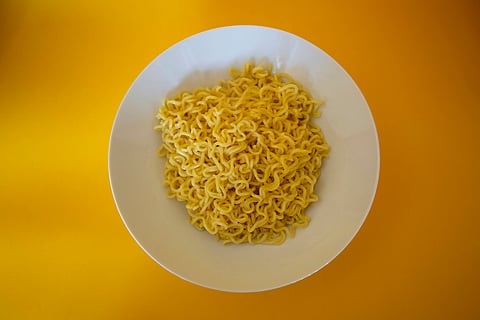
- NEWS
- the EDIT
- COMMENTARY
- BUSINESS
- LIFE
- SHOW
- ACTION
- GLOBAL GOALS
- SNAPS
- DYARYO TIRADA
- MORE

More than 250 representatives from the World Instant Noodles Association (WINA) have vowed to make their products healthier to help promote public health.
During the two-day 11th World Instant Noodles Summit, held in Taguig from 25 to 26 February, global instant noodle leaders set voluntary targets for the industry to promote initiatives in four key areas: nutrition and health, environmental sustainability, food safety, and addressing social issues.
In the area of nutrition and health, industry leaders committed to focusing on healthier products by reducing salt and fat while improving nutritional balance.
"We should focus on addressing issues with regards to nutrition and health," Koki Ando, chairperson of WINA and the President and CEO of Nissin Food, during the signing of the "Manila Declaration" at the end of the summit.
"We have been doing that and we're going to keep doing that," Ando added.
For his part, Monde Nissin CEO and executive vice president Henry Soesanto said the company has already reduced its salt content and will continue to do so, ensuring that this does not affect the product's taste.
Soesanto emphasized that the company has reduced the salt content in its popular "Lucky Me" brand, surpassing WINA's target of a 10 percent reduction by 2030.
"When you reduce the salt, it's not obvious. That's important. Because when it is, your noodles would suddenly taste different because it perks up the taste," Soesanto explained.
When reducing salt, he said that it should be done "gradually," however, he pointed out that education is more important, as people need to understand that excessive salt, fat, and sugar in a product is unhealthy.
"If you reduce suddenly, it isn't delicious, so what will people do? They will no longer eat noodles. What's the replacement for noodles? Other food that is saltier," he added, noting that the average Filipino consumes only 40 packs of instant noodles per year out of 1,000 meals consumed during the period.
Instant noodles have become a global cultural staple, with over 120 billion servings consumed annually.
The Philippines ranks seventh in global instant noodle consumption. In 2023, Filipinos consumed an estimated 5.4 million servings, with "pancit canton" being a local favorite.
"Lucky Me" was the most purchased noodle brand among Filipinos. The calamondin (citrus fruit) and hot chili flavors are particularly popular, while seafood flavor is also a favorite for soup noodles.
WINA noted that Filipinos also enjoy snacking on mini-sized cup noodles.
China topped the global rankings, consuming 42 billion servings of instant noodles per year.
Other top-consuming countries include Indonesia, India, Vietnam, Japan, and the United States. Below the Philippines in the rankings are South Korea, Thailand, Nigeria, Brazil, and Russia.
Mitsuru Tanaka, chief development officer at Nissin Food Holdings, expressed hope that the entire noodle industry "will unite and cooperate with government agencies and other organizations" to address various issues, including consumer health and quality of life.
"I think [instant noodles] will keep on being a staple food, but we will improve the health aspect so people can continue consuming them," Tanaka told reporters on the sidelines of the summit.
Founded in 1997, WINA is a global industry association comprising 133 companies and organizations from 24 countries and regions.
